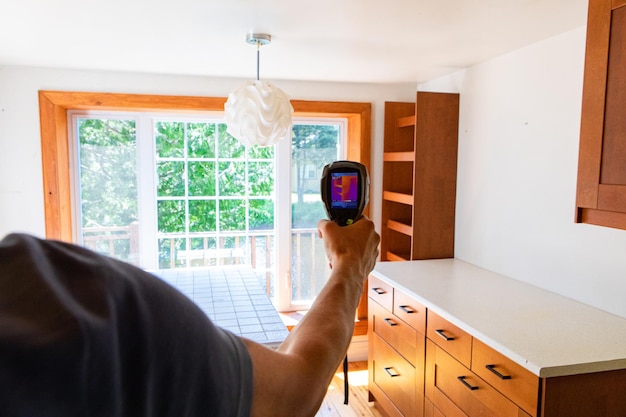Slash Your Utility Bills: Free Energy Audits & Rebates 2025

Slash Your Utility Bills: Free Energy Audits and Rebates Available in 2025 offers homeowners and renters in the US valuable opportunities to reduce energy consumption and lower costs through government and utility-sponsored programs.
Are you looking for ways to reduce your monthly expenses? Slash Your Utility Bills: Free Energy Audits and Rebates Available in 2025 can be your ticket to significant savings while also contributing to a more sustainable environment. Discover how to take advantage of these programs and make your home more energy-efficient.
Understanding Energy Audits and Their Benefits
An energy audit is a comprehensive assessment of a building’s energy consumption. It identifies areas where energy is being wasted and suggests improvements to enhance energy efficiency. These audits are often the first step in a larger plan to reduce utility bills and improve home comfort.
By understanding where your home is losing energy, you can prioritize upgrades that provide the most significant impact. From improving insulation to sealing air leaks, an energy audit can reveal hidden opportunities for savings.
What Does an Energy Audit Involve?
An energy audit typically involves a visual inspection of your home, as well as diagnostic testing to pinpoint specific areas of energy loss. Here’s what you can expect:
- Visual Inspection: A thorough examination of your home’s insulation, windows, doors, and HVAC systems.
- Blower Door Test: This test measures the air tightness of your home by depressurizing the building and identifying air leaks.
- Infrared Scan: Using infrared cameras to detect temperature variations that indicate insulation gaps or air leaks.
- Analysis and Recommendations: A detailed report outlining the audit findings and recommending specific energy-saving measures.
Benefits of a Professional Energy Audit
While you can conduct a basic DIY energy assessment, a professional audit offers several advantages:
- Accuracy: Professional auditors have the knowledge and equipment to accurately assess energy performance.
- Comprehensive Recommendations: They can provide tailored recommendations based on your home’s unique characteristics.
- Eligibility for Rebates: Many rebate programs require a professional energy audit to qualify.

Ultimately, understanding the value and process of energy audits is crucial for homeowners looking to make informed decisions about their energy use. These audits pave the way for targeted improvements and substantial savings.
Exploring Available Rebates for Energy Efficiency
Rebates are financial incentives offered by government agencies, utility companies, and other organizations to encourage energy efficiency improvements. These rebates can significantly reduce the upfront cost of upgrades, making them more accessible to homeowners.
By taking advantage of available rebates, you can save money on energy-efficient appliances, insulation, and other improvements while also lowering your monthly utility bills.
Types of Energy Efficiency Rebates
Rebates come in various forms, each targeting specific energy-saving measures. Here are some common types:
- Appliance Rebates: Incentives for purchasing energy-efficient appliances such as refrigerators, washing machines, and dryers.
- HVAC Rebates: Discounts on high-efficiency heating, ventilation, and air conditioning (HVAC) systems.
- Insulation Rebates: Financial assistance for upgrading your home’s insulation in walls, attics, and basements.
- Window and Door Rebates: Rebates for installing energy-efficient windows and doors that reduce heat loss.
Navigating Federal, State, and Local Programs
Rebate programs are available at the federal, state, and local levels. Each program has its own eligibility criteria, application process, and rebate amounts. Here’s how to navigate them:
- Federal Programs: Check the U.S. Department of Energy’s website for federal tax credits and rebates available for energy-efficient upgrades.
- State Programs: Visit your state’s energy office website to find state-specific rebate programs and incentives.
- Local Programs: Contact your local utility company to inquire about rebates they offer for energy efficiency improvements.
Remember to review the terms and conditions of each rebate program carefully to ensure you meet the eligibility requirements. This often includes purchasing specific energy-efficient products and submitting the required documentation.
Maximizing Savings with Government-Sponsored Programs
Government-sponsored programs play a vital role in promoting energy efficiency by providing financial and technical assistance to homeowners. These programs aim to reduce energy consumption, lower utility bills, and create a more sustainable future.
By participating in these programs, homeowners can access valuable resources and significantly reduce the cost of energy-efficient upgrades.
Overview of Federal Energy Efficiency Initiatives
The federal government offers various initiatives to support energy efficiency. Some key programs include:
- Energy Star: A program that certifies energy-efficient products, making it easier for consumers to identify and purchase them.
- Home Energy Score: A rating system that assesses a home’s energy performance and provides recommendations for improvement.
- Weatherization Assistance Program: Provides funding to low-income households for energy-efficient home improvements.
State-Level Energy Efficiency Programs
Many states have their own energy efficiency programs tailored to their specific needs and priorities. Here are a few examples:
- California: Offers rebates and incentives through programs like Energy Upgrade California.
- New York: Provides resources through the NYSERDA (New York State Energy Research and Development Authority).
- Massachusetts: Runs Mass Save, a collaborative of utility companies offering energy efficiency programs.

Participating in government-sponsored programs provides homeowners with access to funding, expertise, and resources that make energy-efficient upgrades more affordable and effective. These initiatives contribute to a more sustainable energy future while helping families save money on utility bills.
Utility Company Programs and Incentives
Utility companies, driven by regulatory requirements and a commitment to sustainability, offer a range of programs and incentives to help customers reduce energy consumption. These initiatives include rebates, energy audits, and educational resources.
By engaging with your local utility company, you can discover valuable opportunities to save money and make your home more energy-efficient.
Exploring Rebates Offered by Utility Companies
Many utility companies offer rebates for specific energy-efficient upgrades. Here are some common examples:
- Smart Thermostat Rebates: Incentives for purchasing and installing smart thermostats that optimize heating and cooling schedules.
- LED Lighting Rebates: Discounts on energy-efficient LED lighting fixtures and bulbs.
- Water Heating Rebates: Rebates for upgrading to high-efficiency water heaters, including heat pump water heaters.
Energy Audit Services from Utility Providers
Utility companies often provide energy audit services to help customers identify energy-saving opportunities. These audits may be offered at a reduced cost or even free of charge.
These audits provide a comprehensive assessment of your home’s energy use and personalized recommendations for improvements.
Community-Based Energy Efficiency Initiatives
Some utility companies participate in community-based initiatives that promote energy efficiency. These programs may involve:
- Energy Efficiency Workshops: Educational events that teach homeowners how to reduce energy consumption.
- Community Energy Challenges: Competitions that encourage residents to reduce their energy use collectively.
- Partnerships with Local Organizations: Collaborations with community groups to implement energy-saving projects.
By actively engaging with your utility company, you can access valuable resources, rebates, and expertise that will help you save money on your utility bills while contributing to a more sustainable community.
DIY Energy Efficiency Upgrades for Immediate Savings
While professional energy audits and major upgrades can yield significant savings, there are numerous do-it-yourself (DIY) energy efficiency measures you can implement immediately. These simple and cost-effective steps can noticeably reduce your utility bills.
By embracing these DIY strategies, you can start saving money on energy costs right away while also improving the comfort and energy efficiency of your home.
Simple Steps to Reduce Energy Consumption
Here are some easy DIY steps you can take to reduce energy consumption:
- Seal Air Leaks: Use caulk and weather stripping to seal gaps around windows, doors, and other openings.
- Insulate Hot Water Pipes: Wrap insulation around hot water pipes to reduce heat loss.
- Install Low-Flow Showerheads: Replace your showerhead with a low-flow model to reduce water and energy consumption.
Cost-Effective Home Improvement Projects
Consider these cost-effective DIY home improvement projects to enhance energy efficiency:
- Add Attic Insulation: Improve your home’s insulation by adding more to the attic space.
- Install a Programmable Thermostat: Use a programmable thermostat to automatically adjust the temperature settings based on your schedule.
Smart Use of Appliances and Electronics
Adjusting your behavior and use of appliances and electronics can lead to immediate savings:
- Unplug Electronics: Unplug electronic devices and chargers when they’re not in use to eliminate standby power consumption.
- Use Energy-Efficient Settings: Utilize energy-saving settings on your appliances, such as washing machines and dishwashers.
By implementing these DIY energy efficiency upgrades, you can make a positive impact on your utility bills and create a more energy-efficient and comfortable home environment.
Planning and Preparing for 2025 Energy Savings
As we approach 2025, planning and preparing for energy savings is a proactive approach that will help you maximize your benefits from available programs and rebates. Taking the time to assess your needs and explore available opportunities will set you up for long-term savings.
By investing in strategic planning, you can ensure that you make the most of energy efficiency programs and reduce your utility bills in the years to come.
Researching Upcoming Rebate Programs
Stay informed about the latest rebate programs to ensure you don’t miss out on potential savings. Here’s how:
- Monitor Government Websites: Regularly check the U.S. Department of Energy and your state’s energy office website for updates on rebate programs.
- Subscribe to Newsletters: Sign up for newsletters from energy efficiency organizations and utility companies to receive program announcements.
Budgeting for Energy Efficiency Upgrades
Creating a budget specifically for energy efficiency upgrades will help you prioritize projects and allocate funds effectively.
Determine which upgrades will provide the greatest return on investment and align with your financial resources.
Scheduling Energy Audits in Advance
Scheduling an energy audit well in advance of undertaking major upgrades will provide you with valuable insights for planning. Consult you local Utility Company, as was discussed before, since they might offer lower costs.
This valuable insight can allow you to avoid potentially wasted investment on the wrong areas of the house or building.
Conclusion
Embarking on a journey towards energy efficiency in 2025 requires a combination of knowledge, planning, and action. By understanding the benefits of energy audits, exploring available rebates, and participating in government and utility company programs, you can significantly reduce your utility bills. Take the time to assess your needs, research available opportunities, and implement both DIY and professional upgrades to create a more energy-efficient and sustainable home.
| Key Point | Brief Description |
|---|---|
| 💡 Energy Audits | Assess energy use and identify areas for improvement. |
| 💰 Rebates | Financial incentives for energy-efficient upgrades. |
| 🏡 DIY Upgrades | Simple steps for immediate energy savings. |
| 🗓️ Planning | Prepare and maximize 2025 energy savings. |
Frequently Asked Questions (FAQs)
▼
An energy audit is an assessment of a building’s energy consumption, identifying areas of waste. It’s important because it helps homeowners understand where they can improve energy efficiency and reduce utility bills.
▼
You can find rebates by checking the U.S. Department of Energy’s website, your state’s energy office, and your local utility company. Each program has its own eligibility criteria.
▼
Simple upgrades include sealing air leaks with caulk, insulating hot water pipes, and installing low-flow showerheads. These are cost-effective and can lead to immediate savings.
▼
Key federal programs include Energy Star, the Home Energy Score, and the Weatherization Assistance Program. These provide resources and funding for efficient home improvements.
▼
Utility companies offer rebates, energy audits, and community initiatives to reduce energy consumption. Engaging with them provides access to resources, expertise, and valuable savings opportunities.
Conclusion
Reducing your utility bills through energy audits and rebates in 2025 is an achievable goal with the right approach. By combining knowledge, planning, and action, you can save money and contribute to a more sustainable future. Take advantage of available programs and resources to create a more energy-efficient home.
